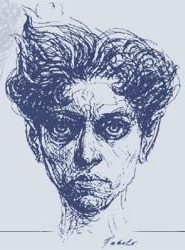Iroel Sanchez
“A blend of sincerity, wonderful man of honor given to the fight, romantic poet, involuntary and tragic Lady of the Camellias punished for tuberculosis and character of socialist realism narrated by Byron”, is how Mexican writer Paco Ignacio Taibo II defines the author Ruben Martinez Villena, the author of the poem “La pupila insomne” that gives name to the blog I do from Cuba and thank the organizers for the invitation to attend this event.
“I have the grim urge and sacred longing/ to peek into my dreams of death/ Oh the sleepless pupil and closed eyelid/ tomorrow I will sleep with the eyelid open.” Since a highschool classmate gave me his poems, the life of that man, especially gifted in poetry, which he gave up early to become a labor leader and organizer of strikes, saying with an irony that will never leave me: “I destroy my verses, I don’t value them, I give them away, they are forgotten: they interest me as much as social justice interests the majority of our writers”, it seemed to me at that moment the most exact and ambiguous definition of someone
who would never abandon his dream.
To those verses I turned, when I was tired to the point of disgust of reading the same lies about my country in the mass media, and encouraged by the example of some people I admire, I decided to start a blog on the internet. I understood for some time that one of the tricks of harrassment used towards Cuba is turning everything about it into something suspicious and to that analysis of the information circulating the web, I decided to dedicate most of my posts.
It is the repetition of certain cliches that are supported by conditioned
reflexes by propaganda, fooling the audiences by magnifying the effects of U.S. policies towards Cuba, but obscuring that these policies are the most significant cause. Thus, the media amplify the impact of U.S. government actions, converting them into the basis of the stereotypes to be reffered to as what happens everyday on the island:
- If fifty years of aggression forced the Cubans to organize for the defense, then Cuba is a “militarized society”.
- If the country applies a tight economic blockade, without access to trade credits and the main international market, “socialism is an economic failure.”
- If from the outside a fifth column is financed acting with the support of some embassies for provocations, these are “fighters for freedom and human rights challenging a dictatorship”.
- A law with clear political intentions favors the entry of Cubans to the U.S. and gives them automatic residency. However, only they (Cubans) “run” from their country, while migrants from twelve Latin American nations surpass them in proportion but rarely make the news.
- Cuba needs to increase its food production and reduce imports, but few know that UNICEF ranked the island as the country with the lowest rate of child malnutrition in Latin America .
- U.S. limits the availability of financial resources and infrastructure to Cuba to access to the internet, but media said the island is an “enemy country of the Internet” and the government that jails Bradley Manning and harrasses Wikileaks to the brink of bankruptcy is ” the country of freedom. “
As is often said by the journalist Rosa Miriam Elizalde, Washington hinders access to the internet for the vast majority of Cubans but has designed an “Internet on demand” for those who serve Washington on the island. However, there are more than a few, who from very different points of view, but without the benefit of the more than $ 20 million each year the U.S. government sends for such “help”, have been putting together their visions of what is happening in their country and the world.
Spaces like “Negra cubana tenia que ser”, addressing racial issues, “Paquito el de Cuba”, that defends the rights of the gay community, “La joven Cuba”, led by a group of students and professors from the University of Matanzas, students of journalism as “El microvave”, communication professionals such as journalism professor Elaine Diaz, Ogun writers such as Guerrero, encouraged by Jorge Angel Hernandez, or “Cambios en Cuba” by Manuel Henriquez Lagarde, who is with me in this event are part of a warp that gives the testimony of a diverse and critical society and rejects criticism that sweetened analysis of their reality as it disregards the manipulations that try to impose from the outside.
They do this, using slow connections, where broadband is more the exception than the rule, in a country whose main network (Infomed, for healthcare workers) has only 16 megabytes to serve over 100,000 users, as part of the 413 has all of Cuba as a whole. Any comparison with a cybercafe, a university or company in the world , illustrates the disadvantages that have been imposed on Cuba for its development and the unequal conditions under which it nevertheless has managed to prepare its population. Consequently, the International Telecommunications Union, places my country;s skills as the world’s fourth in the use of Information Technology and Telecommunications. It is a fact that speaks for itself of the effectiveness with which they have been able to use scarce resources in terms of human development.
Nevertheless, judging the Cuban democracy as a loser against the model that privileges consumerism based technology, is at least tricky. The troubadour Silvio Rodriguez, who has the blog “Segunda Cita”, one of the most active and critical of the Cuban blogosphere, recently wrote “it seems too optimistic to think that the internet is a guarantee of democracy, when there are so many countries with so much internet and democracy is so doubtful. I think it’s more necessary that a country produces and functions correctly than to have broad
band (see that I do not exclude the internet).”
From Cuba we see how that doubtful democracy is rebelled against these days, using the internet, but above all millions of people going out in the streets challenging the indisputable repression and increasingly injust system all over the world. From Athens to Madrid, New York and Santiago de Chile, images are placed on the internet of police charges and cynical responses that the 1% proclaim in front of the 99% that no longer believe the electoral promises and have decided to try to change the rules of the game in which the markets give
orders, not the people.
Increasingly, the blogosphere is giving voice to what the mainstream media has silenced for too long. Where that has been coordinated with organized rebellion of the masses, it has been a growing challenge for those who want to impose with blood and fire a social order that is becoming more and more unfair.
The Egyptian blogger Hossam el-Hamalawy, when questioned about the role of Facebook and Twitter in the revolts of the “Arab Spring”, said “Internet only plays a role in spreading the word and images of what happens on the ground. We do not use the Internet to organize. We use it to publicize what we’re doing on the ground in the hope of encouraging others to participate in the action.”
But there are Internet evangelists. Last November, Alec Ross, director for innovation of the Department of State, spoke at an event in Chile – at the initiative of Civil Society 2.0 Hillary Clinton – trying to seduce the audience, came to say that the Internet is “the Che Guevara of the century XXI ” , causing outrage in the public who questioned the morality of the system that murdered Che, by invoking him.
As I said before, I don’t know if Ross will have read Che to know that the it is not the internet but the rebellion is against the injustice that embodies their ideas. But a few months after his unfortunate quip, it is in Chile, the window from which the U.S. sold its successes for Latin America, where student organizations, unions, neighborhood associations put in blogs the denounciations of the repression they suffer, evidencing the Pinochetist legacy that the medias sweep under the rug. It’s there where Camila Vallejo, a militant of the Communist Youth , announces to millions of our compatriots to demolish a model that denied the right to free quality education for the majority.
Tens of thousands follow Camila on Twitter, but it’s the action of the Student Federation of Chile that legitimize their convocation and fills the streets to express what their organized companeros have agreed to in organized assemblies and meetings.
Disseminating truth aquires its best definition when converted into action to change a reality where money aims to form human conduct, something of course the big media isn’t interested in. As the companero from “Democracy Now” explained here yesterday, the media corporations will only do it as a last resort and always try to manipulate what they can’t control.
Last August, following the first anniversary of our blog’s life, the reporter Pascual Serrano, founder of the site Rebelion and leading media analyst, called “La puplia insomne” a dissident site, adding “let’s see if calling it that it’s easier to appear on Google and those who want to overthrow the revolution read it. Dissident of the lying journalism, dissident of the groups that believe that with money they will be able to convince the Cubans, dissident of the privelidges those who write in the service of those who don’t want the government to govern Cuba, only the markets…”
It’s an endeavor in which alliances have been fundamental. The support of already established alternative spaces such as Rebelion, Cubadebate, Kaos en la Red, Node 50 and Cubainformacion, reproducing much of the contents of La pupila insomne, has been instrumental in positioning. Particularly, the video production of Cubainformacion has converted in just one year more than 80 of our texts into video reports placed on the web, by taking advantage of existing connectivity in Europe that we do not have in Cuba.
Eight years ago when I was far from imagining being involved in this venture, I was involved in an event organized by Portugese friends, reminding me of one of the biggest dissenters in history. I said then: “In this age of Internet and exclusions, satellites and hunger, Karl Marx, smiling and subversive, whispering in the ears of the world: dissidents of all countries, comunicaos “. The journey from then to here and the success the First World Meeting of bloggers for the dissemination of ideas is having and and the growth of the rebellions against capital confirms to me that in dream that insomniac’s pupil and eyelid … open.
Thank you very much.









